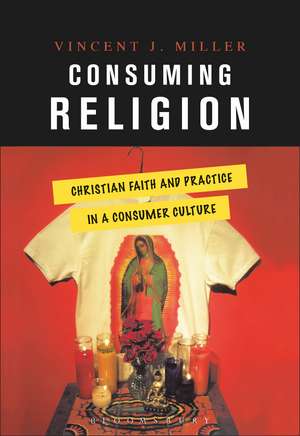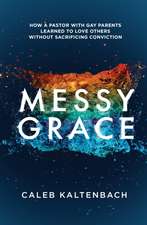Consuming Religion: Christian Faith and Practice in a Consumer Culture
Autor Vincent J. Milleren Limba Engleză Paperback – 31 oct 2005
Preț: 164.26 lei
Preț vechi: 258.43 lei
-36% Nou
Puncte Express: 246
Preț estimativ în valută:
31.43€ • 32.82$ • 26.01£
31.43€ • 32.82$ • 26.01£
Carte tipărită la comandă
Livrare economică 04-18 aprilie
Preluare comenzi: 021 569.72.76
Specificații
ISBN-13: 9780826417497
ISBN-10: 0826417493
Pagini: 262
Ilustrații: black & white illustrations
Dimensiuni: 169 x 244 x 18 mm
Greutate: 0.43 kg
Editura: Bloomsbury Publishing
Colecția Continuum
Locul publicării:New York, United States
ISBN-10: 0826417493
Pagini: 262
Ilustrații: black & white illustrations
Dimensiuni: 169 x 244 x 18 mm
Greutate: 0.43 kg
Editura: Bloomsbury Publishing
Colecția Continuum
Locul publicării:New York, United States
Cuprins
1. How to Think about Consumer Culture2. The Commodification of Culture3. Consumer Religion4. Desire and the Kingdom of God5. The Politics of Consumption6. Popular Religion in Consumer Culture7. Stewarding Religious Traditions in Consumer Culture
Recenzii
"Even though I am not a person of faith, I read Miller's book with a sense of relief. He presents a clear and direct critique of what is wrong with consumer culture, from a humane and consistent point of view....Anyone interested in how theology can be used to address problems of sustainability, inequality, or the extremes of wealth and over-consumption in our society should read this book." -Richard Wilk, professor, Gender Studies and Anthropology, Indiana University
"Well researched, clear thesis, logical argument, ordered presentation, good analysis, internally consistent and conclusions with integrity and a touch of reality. If I sound impressed it's because I am." Insights
Listed as one of the "Top 5 Books on Consumerism" in Christianity Today.
"[A] thorough investigation of the way religious beliefs and practices in contemporary society are dependent upon the socioeconomic factors that structure our daily lives." -Horizons
"He successfully lays down a general framework that will be useful in stimulating and guiding the thought of future scholars and religious observers. The first half of Consuming Religion seems especially suited for teaching on both the graduate and advanced undergraduate levels, since it provides a succinct but sensitive and wide-ranging discussion of various critical theories regarding consumer culture and the fate of religion in the midst of that culture. He is able to move from a compressed discussion of Marx's perception of culture to the work of theorists such as Henri Lefebvre, Guy Debord, and Jean Baudrillard, all in way testifying not only to his mastery of much important work in cultural theory, but also to a considerable synthesizing and didactic skill as a writer." -Journal of the NABPR
"Vincent Miller's book takes our understanding to a new level...This is not only an extremely critical (yet not cynical) analysis, but it is a wonderful read. It will be of interest to scholars in religious studies, sociology, cultural studies, as well as to theologians." -Critical Sociology
"Miller analyzes how consumer culture commodifies everything, including religious practice, making it impossible to confront it head on. Drawing on the work of Michael Foucault and many others, Miller helps the reader understand the power of 'cultural dynamisms that defuse the subversive potential religious and cultural traditions.' His discussions on learning the origins of where a consumer product comes from and on embedding religious practices into the traditions from which they are taken are particularly helpful. This book is not for the faint of heart. Its detailed cultural analysis can be heavy going in places, but one emerges with a much greater understanding of what is going on in our culture and some places where we might begin to make a difference. Miller succeeds in moving the discussion of consumer culture to a new and hopefully more productive level of engagement." -Calvin Theological Journal, April 2006
"In his most remarkable book, Consuming Religion, The North-American theologian Vincent Miller addresses the effects of the commodification of society and the habits of consumer culture on religion in contemporary society. Very convincingly Miller argues that for Christians and their churches, consumer culture is not something out there, but qualifies from the very start their individual and communal identities. As far as Europe is concerned, it would seem that, because of the many other challenges European theology faces today (such as the resurgence of religion in society and new religious movements, the multicultural society and religious pluralism, etc.), a theological engagement of consumer culture hardly appears on its agenda. However, the provocation of consumer culture should not be lost sight of. It is indeed worthwhile to inquire whether Miller's thoughts offer an adequate analysis of the situation of religion and Christianity in Europe, and, consequently, whether the remedy he proposes, will be effective in bringing Christian faith into practice in our European societies, cultures and Christian faith are addressed from a variety of perspectives, in dialogue with Miller's groundbreaking analysis. Apart from Miller, introducing his positions to a European audience, seven European theologians and philosophers take part in this dialogue: Edmund Arens (Luzern), Lieven Boeve (Leuven), Eamonn Conway (Limerick), Paul Cortois (Leuven), Yves De Maeseneer (leuven), Walter Lesch (Louvain-la-Neuve), and Peter Scott (Manchester)."
"Consuming Religion offers a serious look at our culture and provides conceptual resources for evaluating what adds to and what weakens the practice of religion." -Rich Landers, Anglican Theological Review
"Miller's book is, at this time, the best available analysis of the impact of consumer culture on Christian faith and practice. His skillful familiarity with the tools of cultural studies, and their application to the study of religion in a consumer age, makes this essay one of the best examples of inter-disciplinary methodology in the theological field." -Catholic Books Review
"Miller's work...is clearly written for both the theologian and the cultural critic interested in the shape of religious life in contemporary society." -Choice
"Miller offers a critical analysis of consumer culture, not in order to condemn it as spiritually vacuous, but to discern possibilities for spiritual transformation....By affirming the potential of religious traditions to subvert the politics of the status quo and hold open a transformative option in contemporary culture, Miller's Consuming Religion is not only provocative but hopeful."-Christian Century
"This creative, demanding, learned, and almost inordinately balanced book is required reading. It is a pleasure to read such an outstanding introduction to who Christians have already becomes, and to how theology can assist in the postmodern cure of souls." -Theological Studies, 66.1, 3/05
"Well researched, clear thesis, logical argument, ordered presentation, good analysis, internally consistent and conclusions with integrity and a touch of reality. If I sound impressed it's because I am." Insights
Listed as one of the "Top 5 Books on Consumerism" in Christianity Today.
"[A] thorough investigation of the way religious beliefs and practices in contemporary society are dependent upon the socioeconomic factors that structure our daily lives." -Horizons
"He successfully lays down a general framework that will be useful in stimulating and guiding the thought of future scholars and religious observers. The first half of Consuming Religion seems especially suited for teaching on both the graduate and advanced undergraduate levels, since it provides a succinct but sensitive and wide-ranging discussion of various critical theories regarding consumer culture and the fate of religion in the midst of that culture. He is able to move from a compressed discussion of Marx's perception of culture to the work of theorists such as Henri Lefebvre, Guy Debord, and Jean Baudrillard, all in way testifying not only to his mastery of much important work in cultural theory, but also to a considerable synthesizing and didactic skill as a writer." -Journal of the NABPR
"Vincent Miller's book takes our understanding to a new level...This is not only an extremely critical (yet not cynical) analysis, but it is a wonderful read. It will be of interest to scholars in religious studies, sociology, cultural studies, as well as to theologians." -Critical Sociology
"Miller analyzes how consumer culture commodifies everything, including religious practice, making it impossible to confront it head on. Drawing on the work of Michael Foucault and many others, Miller helps the reader understand the power of 'cultural dynamisms that defuse the subversive potential religious and cultural traditions.' His discussions on learning the origins of where a consumer product comes from and on embedding religious practices into the traditions from which they are taken are particularly helpful. This book is not for the faint of heart. Its detailed cultural analysis can be heavy going in places, but one emerges with a much greater understanding of what is going on in our culture and some places where we might begin to make a difference. Miller succeeds in moving the discussion of consumer culture to a new and hopefully more productive level of engagement." -Calvin Theological Journal, April 2006
"In his most remarkable book, Consuming Religion, The North-American theologian Vincent Miller addresses the effects of the commodification of society and the habits of consumer culture on religion in contemporary society. Very convincingly Miller argues that for Christians and their churches, consumer culture is not something out there, but qualifies from the very start their individual and communal identities. As far as Europe is concerned, it would seem that, because of the many other challenges European theology faces today (such as the resurgence of religion in society and new religious movements, the multicultural society and religious pluralism, etc.), a theological engagement of consumer culture hardly appears on its agenda. However, the provocation of consumer culture should not be lost sight of. It is indeed worthwhile to inquire whether Miller's thoughts offer an adequate analysis of the situation of religion and Christianity in Europe, and, consequently, whether the remedy he proposes, will be effective in bringing Christian faith into practice in our European societies, cultures and Christian faith are addressed from a variety of perspectives, in dialogue with Miller's groundbreaking analysis. Apart from Miller, introducing his positions to a European audience, seven European theologians and philosophers take part in this dialogue: Edmund Arens (Luzern), Lieven Boeve (Leuven), Eamonn Conway (Limerick), Paul Cortois (Leuven), Yves De Maeseneer (leuven), Walter Lesch (Louvain-la-Neuve), and Peter Scott (Manchester)."
"Consuming Religion offers a serious look at our culture and provides conceptual resources for evaluating what adds to and what weakens the practice of religion." -Rich Landers, Anglican Theological Review
"Miller's book is, at this time, the best available analysis of the impact of consumer culture on Christian faith and practice. His skillful familiarity with the tools of cultural studies, and their application to the study of religion in a consumer age, makes this essay one of the best examples of inter-disciplinary methodology in the theological field." -Catholic Books Review
"Miller's work...is clearly written for both the theologian and the cultural critic interested in the shape of religious life in contemporary society." -Choice
"Miller offers a critical analysis of consumer culture, not in order to condemn it as spiritually vacuous, but to discern possibilities for spiritual transformation....By affirming the potential of religious traditions to subvert the politics of the status quo and hold open a transformative option in contemporary culture, Miller's Consuming Religion is not only provocative but hopeful."-Christian Century
"This creative, demanding, learned, and almost inordinately balanced book is required reading. It is a pleasure to read such an outstanding introduction to who Christians have already becomes, and to how theology can assist in the postmodern cure of souls." -Theological Studies, 66.1, 3/05









